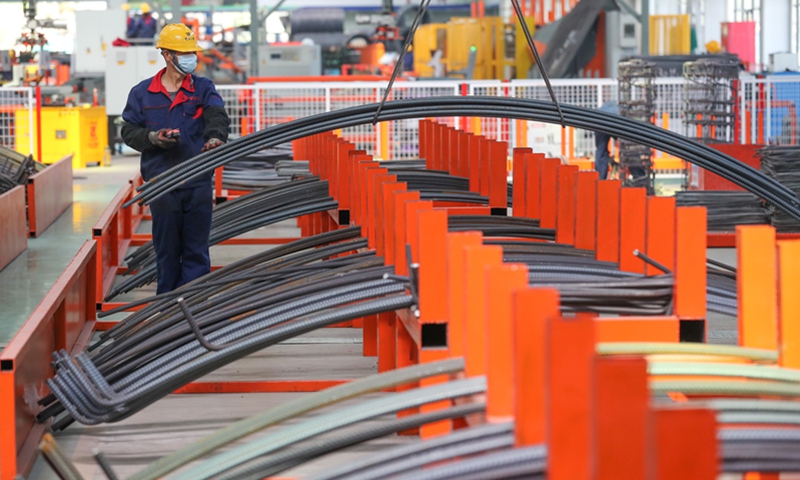
A worker works in a factory in the Deqing Green Building Industrial Park in Huzhou, East China's Zhejiang Province, on April 6, 2022. Photo: cnsphoto
The recent volatility seen in China's financial markets has just fueled a new round of commentary around the "China collapse theory," which was repeatedly struck down by reality. And this time will be no exception.
Bloomberg asserted on Tuesday that China is "running out of ways to stem self-made market meltdown," claiming that its strict zero-COVID policy has left the country "stuck in a repeat of lockdowns" while the West withdraws stimulus to battle surging inflation.
Specifically, Bloomberg article referenced the bearish performance of China's stock market as if to signal a collapse in investor confidence throughout the Chinese economy. There is no denying that the A-share markets have suffered considerable losses this year, with the benchmark Shanghai Composite Index losing 18.72 percent and the ChiNext board plunging 31.71 percent as of Wednesday close.
It is true that the combination of a bear market and downward economic pressure often gives the impression that the Chinese economy is in serious trouble, which is why whenever China's financial markets suffer certain setbacks, some Western media outlets will spare no effort to play up their doomsday predictions about China's economy, a demonstration of their ideological bias and obsession over making dire predictions.
However, this "collapse theory" has never gained the support from any specific economic indicators. This is because despite the relatively weak stock market, the Chinese economy has always been on the rise based on the steady fundamentals. By contrast, the economic crisis in some Western countries seems far more statistically supported than China's collapse.
Admittedly, there are growing concerns over the economic impact of the strict zero-COVID policy after Shanghai and other major cities entered so-called "static management." And it is understandable for the market sentiment to be sensitive to the development and thus lead to market volatility.
But it is far-fetched to assert China's anti-epidemic efforts will lead to a market meltdown in the world's second-largest economy, because despite some short-term loss, the strict measures are aimed at minimizing the economic cost in the long run by keeping intact the foundation of China's economic resilience.
For instance, the latest data released on Wednesday by the National Bureau of Statistics showed that profits at China's industrial companies grew 12.2 percent year-on-year in March. If anything, this is the most obvious proof that the real economy has still been developing at a steady pace. In addition, some economic indicators showed that the manufacturing sector, property market and infrastructure investment have remained generally stable recently, despite the negative impact from the epidemic resurgence.
Of course, it would be a disaster if the government and businesses sit idle and fail to address emerging problems and challenges. But what we have seen is that the whole country is working hard to tackle with the current difficulties, with all kinds of targeted economic policies and stimulus being released.
China's central bank in mid-April announced a 25 basis points reduction in banks' reserve requirements, the first cut of the year. While it may be smaller than market expectation and showed the wariness of excessive stimulus, it is also an indication that the situation is not that "dangerous."
Moreover, China still has plenty of options when it comes to issuing stimulus measures. A top meeting on Tuesday stressed efforts to strengthen the construction of China's infrastructure in an all-round way, which is of great significance to ensure national security, expand domestic demand, foster the dual circulation strategy and promote the high-quality development.
Therefore, there is every reason to believe that with the help of a series of stimulus policies, the government will effectively protect the fundamentals of the Chinese economy from any shock. And doomsayers will once again be humiliated when China's economy defies their predictions.



